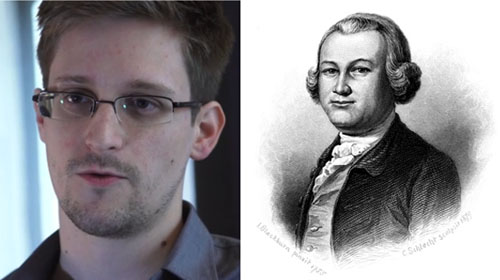A Brilliant Young Man Who Left Plum Job in Opposition to General Warrants (in 1760)


A new for the Boston Globe reveals that 40 percent of Massachusetts residents oppose “the government obtaining phone and electronic records of US citizens,” while only 25 percent support it. These numbers make clear that Commonwealth residents still hold dear the very principles of American justice that were born under our feet.
After all, our state has long been a cradle of liberty, and the Fourth Amendment was practically born in Boston.
Do you know about James Otis, his struggle against the British Empire, and the making of the Fourth Amendment? A brilliant, young attorney, Otis became practically obsessed with what he viewed as a profound injustice visited upon the American colonists by their British rulers: the writs of assistance.
Writs of assistance were essentially general warrants. They allowed British soldiers to raid and search homes based on no suspicion whatsoever of criminal activity. Any soldier could violate the sanctity of anyone’s person or home. The British foot soldiers didn’t have to have any reason whatsoever for these searches. The writs of assistance were extreme violations of the basic privacy and property rights of Americans, and the American revolutionaries loathed them – no one more eloquently or passionately than Otis.
An extremely talented and ambitious man, Otis was Advocate-General of the colony of Massachusetts at only 31 years old, the equivalent of today’s attorney general. His ambition did not surpass his commitment to justice, however: Otis resigned in disgust when tasked with defending the legitimacy of the British Empire’s general writs. Almost immediately afterwards, a group of Boston merchants sought his help to oppose the writs before the Massachusetts superior court. Otis refused to accept payment and argued the case with passion and vigor.
The young attorney’s railing against the writs of assistance, “in opposition to a kind of power, the exercise of which in former periods of history cost one king of England his head and another his throne,” is now a famous speech.
What did Otis say that had such a profound effect on the future of our nation?
Specific warrants describing the people, places or things to be searched, and sworn by an affirmation, are legitimate and legal, Otis said. But general warrants, those that do not require any specific information or targeting – those warrants that enable the government to search at will – are illegal. He said it like this:
Your Honors will find in the old books concerning the office of a justice of the peace precedents of general warrants to search suspected houses. But in more modern books you will find only special warrants to search such and such houses, specially named, in which the complainant has before sworn that he suspects his goods are concealed; and will find it adjudged that special warrants only are legal. In the same manner I rely on it, that the writ prayed for in this petition, being general, is illegal. It is a power that places the liberty of every man in the hands of every petty officer. I say I admit that special Writs of Assistance, to search special places, may be granted to certain persons on oath; but I deny that the writ now prayed for can be granted…
Although Otis lost the case, his rhetoric profoundly altered the course of history. It just so happened that a young John Adams was sitting in the courtroom on the day Otis railed against the writs. That same John Adams would go on to pen the Massachusetts Declaration of Rights, the Fourteenth Amendment of which would serve as inspiration for the Fourth Amendment to the United States Constitution.
It’s clear as day that the NSA’s bulk collection orders, like the one Edward Snowden disclosed from Verizon, violate the principles James Otis laid out in his famous attack against the writs of assistance. These orders are not directed at any one of us, but instead sweep up records about all of our communications, violating both the letter and the spirit of the Fourth Amendment, which clearly states that the government cannot rummage through our personal effects absent specific, probable cause and a sworn affidavit.
Why did James Otis throw away his career as the top lawyer in the colony, risking his future and his family’s stability?
“The only principles of public conduct that are worthy of a gentleman or a man are to sacrifice estate, ease, health, and applause, and even life, to the sacred calls of his country,” he told the court.
That sounds eerily familiar to what. When asked what he would tell people like him, “in a position to leak classified information that could improve public understanding of the intelligence apparatus of the USA and its effect on civil liberties,” Snowden simply replied:
“This country is worth dying for.”
The poll numbers show what we’ve long known here in the Bay State: we won’t give up our liberty lightly. James Otis should rest easy and Edward Snowden should take heart knowing that at least here in Massachusetts, their sacrifices are not in vain.

